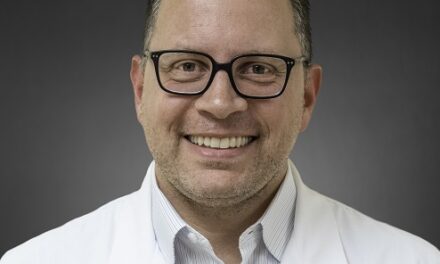.jpg) Einstein extolled the virtue of experience as a valuable teacher. Miami Dade College Medical Campus President, Dr. Bryan Stewart and Health Career faculty couldn’t agree more.
Einstein extolled the virtue of experience as a valuable teacher. Miami Dade College Medical Campus President, Dr. Bryan Stewart and Health Career faculty couldn’t agree more.
Stewart brings his enthusiasm and experience to Florida, creating a Simulation Hospital in which students had first dibs in the Fall 2019 quarter! What was once an underutilized parking lot is now a 5-story center for experiential health science learning which broke ground in 2016. An entire floor is devoted to 17 rooms where student nurses have real life experiences delivering babies, caring for post-operative patients, delivering home care in an apartment scenario to trauma care readiness during EMS ambulance simulations. Sophisticated, lifelike, state-of-the-art mannequins imitate the reality of immediate health issues where students can react and apply classroom learning to monitor a suspect heart tone, bowel sound, pulse, blood pressure reading or breathing inconsistencies and other critical patient history and physical data. Instructional facilities also include active learning classrooms, a technology-rich lecture hall, and a multipurpose conference venue. What is the difference between this and a clinical nursing internship you ask? Well, this simulated environment provides a realistic but safe learning experience with no threat to patient safety.
Mannequins represent newborns to adults with multiple ethnic and racial backgrounds. These mannequins simulate clinical issues (planned by faculty) in 52 different languages adding an additional component beyond nursing care to cultural understanding. The mannequins’ price tag represented approximately $4 million of the total $58 million investment in this learning environment, designed to encourage independent, hands-on learning which embraces student missteps.
A clinically versatile design was incorporated in the simulation hospital which mirrors the clinical environment of a real hospital with medical surgical rooms, OB labor and delivery rooms, pediatric rooms, an operating room, a simulated ambulance set up, exam rooms, a homelife apartment, debriefing rooms, and a 150 seat lecture hall. While at the Simulation Hospital, students will develop the necessary critical thinking skills to be successful in a wide range of healthcare delivery scenarios.
 Other innovative technology is available to 25 different health sciences course studies including respiratory therapy, histology and clinical lab students, physician assistants and EMS students with mannequins and unique technology offering real life hospital situations for study and analysis in an educational climate.
Other innovative technology is available to 25 different health sciences course studies including respiratory therapy, histology and clinical lab students, physician assistants and EMS students with mannequins and unique technology offering real life hospital situations for study and analysis in an educational climate.However, don’t assume this current technology is robotic or devoid of faculty guidance or participation. In fact, students and faculty record, review and evaluate performance in a debriefing, which is an indispensable aspect of simulation learning according to Stewart. “During debrief sessions, real time observation is compared to best clinical practices and students can build knowledge backed by evidence-based methodologies. The recordings allow students and instructors to evaluate practice, stimulate team cooperation and improve patient outcomes,” Stewart explained.
During the first quarter more than 1600 students have participated in the learning experience – approximately 60% seeking nursing careers and close to 40% other health science students. “A key principle of our program: creating an environment of multidisciplinary collaboration by bringing together students from various fields to work and communicate as a team, is incorporated into practice settings to improve interdisciplinary communications,” Stewart explained. “Expert research shows the Simulation Hospital prepares students with evidence-based principles and clinical skills they will need in real world clinical environments. Safe practice helps reduce errors, improve safety, breakdown traditional professional silos and enhance interprofessional collaboration, ultimately elevating the quality of patient care,” he summarized.
Future Plans
Continuing Education In addition to the enhancing student education, which is a valuable recruitment and job placement tool, Stewart sees a ‘corporate’ benefit in sharing this technological advancement with hospital CEO’s and Directors of Nursing and Allied Health Professions. Designing programs to support continuing education requirements and helping existing professionals to stay abreast of new techniques and methodologies in a nearby setting is an advantage to the health care community and a ‘corporate’ aspect of education plans.
Virtual Reality
Introducing virtual reality simulation techniques into the curriculum is being studied. Through the use of goggles and avatars, virtual reality is designed to immerse a student in a realistic environment of treatment. Virtual reality focuses on clinical decision-making in addition to actual skills to help students develop care plans. Students can also view lab results, imaging results and additional patient data to support clinical decisions. Virtual reality can expand the physical classroom to home study and review since it is available in many formats.
Accreditation
The Miami Dade College Simulation Hospital held a grand opening in July and matriculated the first classes in Fall, 2019. It is currently building and evaluating the educational experience to meet all standards to apply for accreditation following a two-year track record of excellence in multidisciplinary assessment, research, and teaching.
To date students with the advantage of participating in the hospital simulator curriculum seem to agree with our forefather Benjamin Franklin’s assessment of educational methods …
“Tell me and I forget. Teach me and I remember. Involve me and I learn.”
Miami Dade College Medical Campus opened in 1977 on 4.3 acres in the heart of the Miami Health District. The campus supports a variety of certificate and degree levels in nursing and allied health education options. Students at the Medical Campus learn as they build their experience in a state-of-the-art Simulation Hospital and also through two clinics under the guidance of distinguished faculty and partners. According to the U.S. Department of Education, the college ranks first nationwide in awarding health profession and nursing degrees.


























